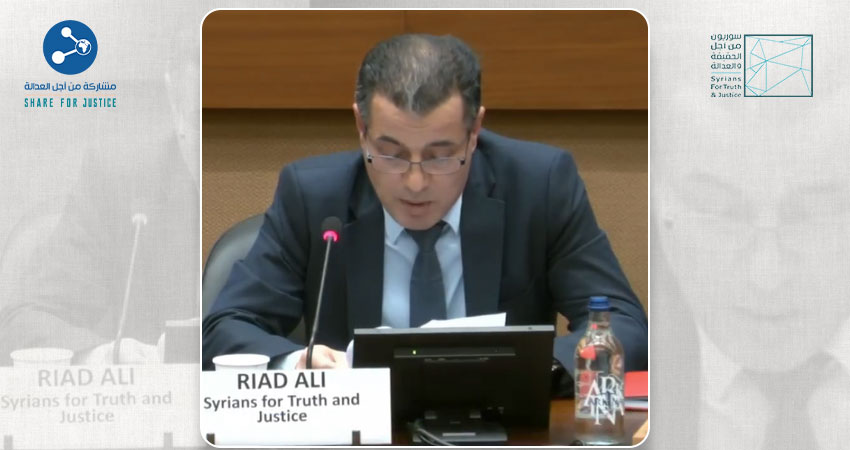At the invitation of the Cairo Institute for Human Rights Studies, Syrians for Truth and Justice (STJ) took part in a side event held on the sidelines of the 58th session of the Human Rights Council at the Palais des Nations in Geneva, Switzerland. The event, titled “The Role of Syrian Civil Society in Enabling Syria to Achieve Democracy and the Rule of Law,” was organized in cooperation with the Syrian Center for Media and Freedom of Expression, the Association for Victims of Forced Displacement (DAR), and the Civil Defense Organization (White Helmets)
Representatives from more than 40 countries participated in the side event held on 17 March 2025. The session focused on the current situation in Syria, the urgency of halting ongoing violations by all parties, and the necessity of pursuing transitional justice while ensuring accountability for perpetrators from all sides without discrimination. STJ was represented at the event by its legal advisor, Judge Riad Ali.
During his intervention, the representative of STJ focused on developments in Syria following 8 December 2024, particularly the “National Dialogue Conference” held on 25 February 2025, which fell short of expectations and was a missed opportunity, as it failed to represent all segments and components of the Syrian people. Additionally, invitations were sent out only one day before the event, and the final statement had been prepared in advance, especially given that the number of attendees was close to 600 Syrian figures, while the actual working hours did not exceed six. It was evident that the true purpose of the conference was merely to grant the president political “legitimacy” and solidify his position in power.
Judge Riad Ali also addressed the flaws and shortcomings of the Constitutional Declaration signed on 13 March by the Transitional President, Ahmad al-Sharaa. The Declaration grants the president vast powers, making him both the head of the executive authority and the presiding figure the Supreme Judicial Council. Additionally, the president appoints one-third of the members of the Interim People’s Assembly, designates a higher committee to select the remaining two-thirds, nominates members of the Constitutional Court, and holds the authority to appoint and dismiss ministers, in addition to the other powers granted to him under this declaration. Notably, the declaration stipulates that the president is not accountable for his actions and cannot be questioned or held responsible.
Another point raised was the requirement that any candidate running for the presidency must be a Muslim. This condition effectively excludes individuals from other religions, such as Christianity and Yazidism, from the right to run for this position. This contradicts the principle of equal citizenship stipulated in Article 10 of the Constitutional Declaration, which states: “Citizens are equal before the law in rights and duties, without discrimination based on race, religion, gender, or lineage.” Additionally, the issue of designating Islamic jurisprudence as the primary source of legislation was raised, highlighting the potential marginalization and exclusion of other religions. Moreover, there is no clear standard for this jurisprudence, given the multitude of differing jurisprudence interpretations and opinions within Islamic religion.
At the same time, the Constitutional Declaration does not mention the word “democracy,” raising doubts about the new government’s intentions and its willingness to rule the country in the same manner it previously governed Idlib during an earlier stage of the Syrian conflict.
STJ representative confirmed that the Constitutional Declaration had been pre-prepared. It was leaked on the same day the drafting committee was appointed, revealing a similarity between the leaked version and the officially announced one, possibly to the point of being identical.
Furthermore, designating Syria as the “Syrian Arab Republic,” declaring Arabic as the country’s “official language,” and disregarding other languages contribute to the marginalization and exclusion of the other components, minorities, and languages in the country. This reinforces the same approach previously adopted by the Arab Socialist Ba’ath Party in excluding non-Arab components.
Additionally, several other issues were raised, further undermining confidence in the Constitutional Declaration among many Syrians.
Despite this, the representative of STJ reaffirmed the organization’s commitment to supporting stability in Syria and its willingness to cooperate with the current government to achieve this goal while upholding Syrian human rights and fundamental freedoms.
He also emphasized the organization’s dedication and commitment to its duties and the professional ethics dictated by the values of civil work, particularly independence and neutrality. Accordingly, he reaffirmed the organization’s ongoing efforts to monitor and document any violations that may occur in Syria in the future, regardless of the perpetrating party, including the Transitional Government.

